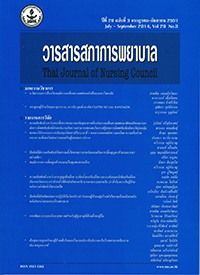นวัตกรรมการป้องกันพฤติกรรมเสี่ยงทางเพศของนักศึกษามหาวิทยาลัย
Keywords:
นวัตกรรมการป้องกัน พฤติกรรมเสี่ยงทางเพศ นักศึกษามหาวิทยาลัย, innovative prevention, sexual risk behaviours, university studentsAbstract
บทคัดย่อ
วัตถุประสงค์ของโครงการนี้เพื่อให้นักศึกษาที่เข้าร่วมโครงการ 1) มีความเข้าใจและตระหนักรู้ถึงพฤติกรรมเสี่ยงทางเพศ 2) มีทักษะการปฏิเสธในสถานการณ์ที่อาจถูกชักชวนให้มีเพศสัมพันธ์ และ 3) เลือกวิธีการมีเพศสัมพันธ์ที่ปลอดภัย โครงการนี้ เป็นการทำงานร่วมกันระหว่าง อาจารย์ในโครงการ นักศึกษาแกนนำและผู้บริหารมหาวิทยาลัย ในการทำงานกับนักศึกษาแกนนำใช้แนวคิดการให้พลังอำนาจ (empowerment) โดยให้นักศึกษาแกนนำวางแผนและคิดกิจกรรมตามโจทย์ของโครงการด้วยตัวนักศึกษาเอง โครงการนี้ดำเนินการครั้งละ 2 วัน ผู้เข้าร่วมโครงการเป็นนักศึกษาชั้นปีที่ 1 ครั้งละ 20 คน จัดทั้งหมด 3 ครั้ง รวมนักศึกษาเข้าร่วมโครงการ 60 คน การทำกิจกรรมแต่ละวันแบ่งเป็น 2 กลุ่ม วันแรกกลุ่มที่ 1 เป็นกิจกรรมสะท้อนคิดเกี่ยวกับพฤติกรรมเสี่ยงทางเพศ ทักษะการต่อรองทางเพศและการมีเพศสัมพันธ์ที่ปลอดภัย กลุ่มที่ 2 เป็นกิจกรรมการเลี้ยงเด็กซึ่งหุ่นเด็กสามารถตอบสนองได้เสมือนเด็กจริงร่วมกับการมีโจทย์ให้ทำภารกิจประจำวันที่ใกล้เคียงชีวิตจริงของนักศึกษาเพื่อให้นักศึกษาเรียนรู้ว่า การมีลูกในภาวะที่ไม่พร้อมเป็นอย่างไร วันที่ 2 เป็นการสลับกลุ่มกันเพื่อให้นักศึกษาทั้ง 2 กลุ่มได้ประสบการณ์เหมือนกัน
ผลลัพธ์ของโครงการ จากการประเมินนักศึกษาที่เข้าโครงการด้านความเชื่อมั่นต่อการปฏิเสธการมีเพศสัมพันธ์ที่ไม่ปลอดภัยตามสถานการณ์ก่อนและหลังเข้าโครงการ พบว่า มีความแตกต่างกันอย่างมีนัยสำคัญทางสถิติ (p<.01) ด้านความเชื่อมั่นต่อการมีเพศสัมพันธ์ที่ปลอดภัยตามสถานการณ์ก่อนและหลังเข้าโครงการ มีความแตกต่างกันอย่างมีนัยสำคัญทางสถิติ (p<.001)เช่นกัน บทเรียนความสำเร็จ พบว่า แกนนำทุกคนประเมินว่าแนวคิดการให้พลังอำนาจเป็นวิธีการที่ดี มีอิสระในการทำงาน ได้พัฒนาความสามารถของตนเอง และเกิดความภาคภูมิใจในผลงาน ส่วนผู้เข้าร่วมโครงการ มีความพึงพอใจและประเมินว่าเป็นโครงการที่ดี มีประโยชน์มาก ด้านปัญหาและอุปสรรคที่พบ ได้แก่ 1) ไม่สามารถได้กลุ่มเป้าหมายตามแผนงาน 2) ต้องเปลี่ยนแปลงวันการจัดกิจกรรมตามแผนเดิมเนื่องจากซ้ำซ้อนกับกิจกรรมของมหาวิทยาลัย
ข้อเสนอแนะของโครงการนี้ ได้แก่ 1) กลุ่มเป้าหมายควรมุ่งกลุ่มเสี่ยงคือกลุ่มที่มีแฟน 2) การจัดกิจกรรมควรพิจารณาช่วงเวลาที่เหมาะสมสำหรับนักศึกษา 3) แนวคิดการให้พลังอำนาจใช้ได้ดีมากกับนักศึกษา และ 4) โครงการควรได้รับการสนับสนุนจากผู้บริหาร
Abstract
The main objective of this research project was to equip the participating students with (1) the understanding and awareness of sexual risk behaviours; (2) skills in denying sexual intercourse persuasion; and (3) ability to practice safe sex. This research project was task jointly undertaken by the project-operating teachers, student-leaders and the university’s administrators. The project-operating teachers adopted the concept of empowerment to engage the student-leaders in independently planning and designing activities according to the project’s principles.
The project was implemented in three rounds. Each round took two activity days and was participated by 20 first-year students, hence a total of 60 participants. On the first activity day, the first group of participants was encouraged to reflect on sexual risk behaviours, skills in making sex denials and practice of safe sex. The second group, on the other hand, was engaged in a combination of baby-caring practice using a ‘virtual’ baby dummy and daily activity simulation to help the group’s members understand what it would be like to have babies when they were not ready. On the second activity day, the two groups switched activities. In this way, both groups were required to do the same set of activities.
The project showed the following results. After the participation, the participants displayed a significant increase in making sex denials, by p < .01. They also showed a significant increase in safe-sex confidence by p < .001. The lesson of success drawn upon this project was that every student-leader considered the method of empowerment as being effective, independent, self-developmental and pride-instigating. The participants, meanwhile, regarded this project as being satisfactory and very helpful. Main problems encountered included (1) the target groups could not be arranged exactly according to the project plan; and (2) some activity days had to be changed so that they would not coincide with the university’s activity days.
Major recommendations are as follows: (1) the target subjects should exclude high-risk students, that is, those already having boyfriends or girlfriends; (2) the activity days should be convenient for the participants; (3) the concept of empowerment could be effectively applied to students; and (4) a project such as this should receive proper support from the administration.








